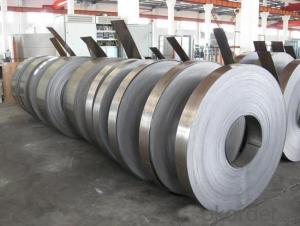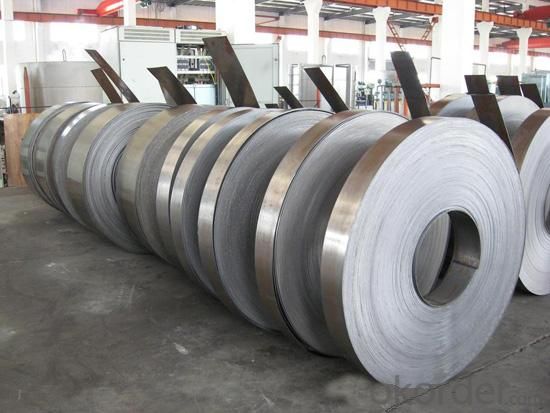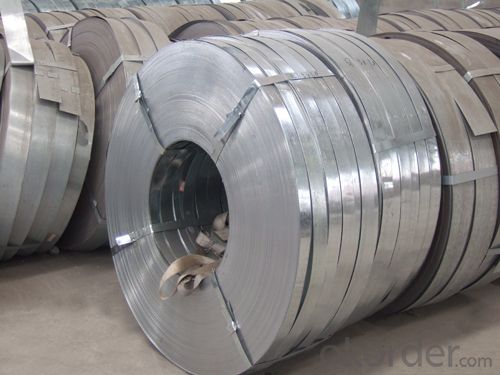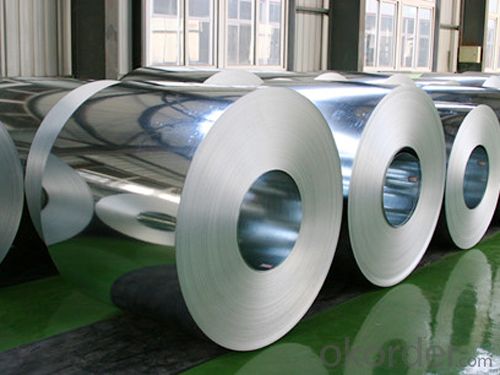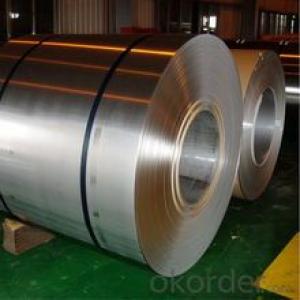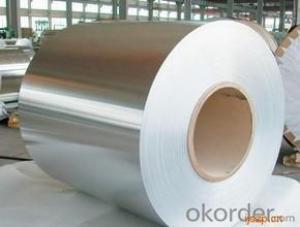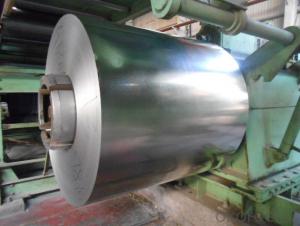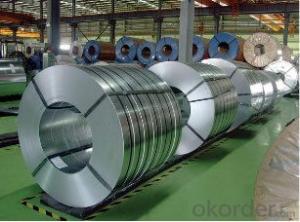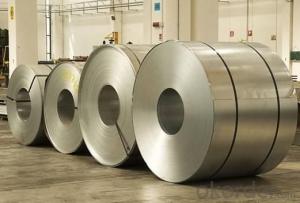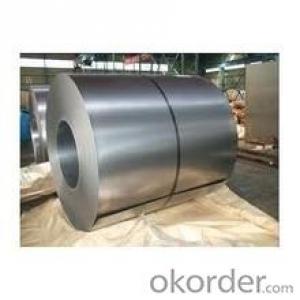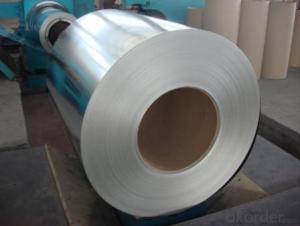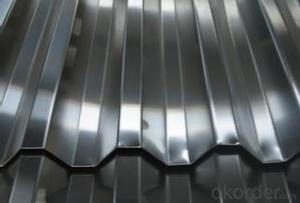Hot-Dip Galvanized Steel Strip/ Coil from China
- Loading Port:
- Tianjin
- Payment Terms:
- TT OR LC
- Min Order Qty:
- 25 m.t.
- Supply Capability:
- 15000 m.t./month
OKorder Service Pledge
OKorder Financial Service
You Might Also Like
1.Structure of Hot-Dip Galvanized Steel Strips Description:
Hot-dip galvanized steel coils are available with a pure zinc coating through the hot-dip galvanizing process. It offers the economy, It is especially useful for countless outdoor and industrial applications. Production of cold formed corrugated sheets and profiles for roofing, cladding, decking, tiles, sandwich walls, rainwater protective systems, air conditioning duct as well as electrical appliances and engineering.
2. Main Features of the Hot-Dip Galvanized Steel Strips:
• Excellent process capability
• Smooth and flat surface
• Workability, durability
• Excellent anticorrosive property
• Good visual effect
3. Hot-Dip Galvanized Steel Strips Images
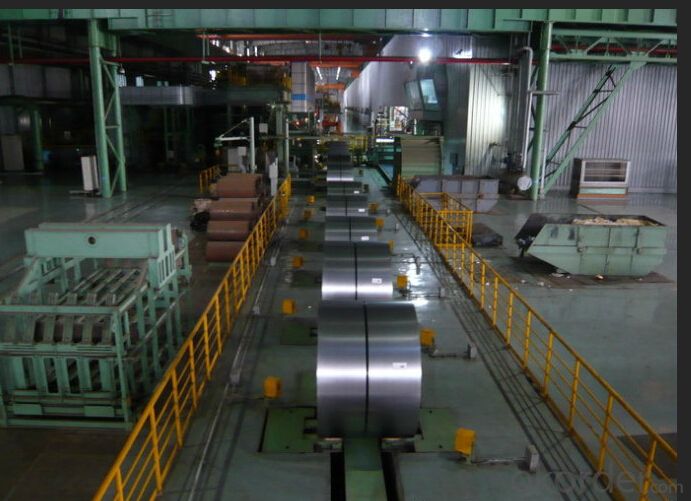
4. Hot-Dip Galvanized Steel Strips Specification
1) Capacity: about 15,000 tons per month for sheet product.
2) Standard: JIS G3302 1998, ASTM A653M/A924M 2004, all according to the customer's request
3) Thickness: 0.13mm-0.5mm
4) Width: 400mm-1000mm
5) Length: We can adjust the length according to your request
6) Zinc Coating Weight: 60g/m2-275g/m2
7) Raw Materials: Galvanized steel sheet and Pre-painted galvanized steel sheet
8) Spangle: Regular spangle, minimized spangle and zero spangle
9) Hardness: Full hard, normal
10) Color: RAL, or other series
11) Surface Protection: PE, PVC, PVDF, SMP, HDP, etc.
12) Min trial order 10 tons each thickness, 1x20' per delivery
5.FAQ of Hot-Dip Galvanized Steel Strips
We have organized several common questions for our clients,may help you sincerely:
3. How long can we receive the product after purchase?
Production period is 30 days. And we’d prefer you can give us more time to book vessel.
- Q: can anyone help me to find any webpage about lists/types of stainless steel?
- Types of stainless steel There are over 150 grades of stainless steel, of which fifteen are most common. The AISI (American Iron and Steel Institute) defines the following grades among others: - 200 Series—austenitic iron-chromium-nickel-manganese alloys - 300 Series—austenitic iron-chromium-nickel alloys Type 301—highly ductile, for formed products. Also hardens rapidly during mechanical working. Type 303—free machining version of 304 via addition of sulfur Type 304—the most common; the classic 18/8 stainless steel Type 316—Alloy addition of molybdenum to prevent specific forms of corrosion - 400 Series—ferritic and martensitic alloys.
- Q: How are steel coils used in the manufacturing of metal containers?
- Steel coils are used in the manufacturing of metal containers as they are processed into flat sheets or strips, which are then cut, formed, and welded to create the desired shape and size of the container. The coils provide a strong and durable material that can withstand the pressure and weight of the contents inside the container, ensuring its structural integrity and longevity.
- Q: How are steel coils inspected for bendability?
- Steel coils are inspected for bendability through a combination of visual examination, mechanical testing, and dimensional analysis. Visual inspection involves identifying any visible defects such as cracks, dents, or surface irregularities that could affect the coil's bendability. Mechanical testing is conducted to measure the coil's resistance to bending and evaluate its flexibility. This includes performing bend tests to determine the coil's ability to withstand a specified degree of bending without breaking or cracking. Additionally, dimensional analysis is performed to ensure that the coil meets the required thickness, width, and length specifications, as these factors also impact its bendability.
- Q: What are the challenges in coil recoiling?
- Coil recoiling, which is also known as coil winding, brings about a range of challenges that depend on the specific application and requirements. Some of the common hurdles encountered in coil recoiling are as follows: 1. Precision and accuracy: Achieving precise and accurate winding is vital for optimal coil performance. It is crucial to maintain consistent tension throughout the winding process, ensure proper alignment, and control the speed in order to prevent variations in the electrical properties of the coil. 2. Wire management: Managing the wire during the recoiling process can be difficult. The wire may be fragile, prone to tangling, or have specific handling requirements, such as being sensitive to magnetic or thermal influences. Employing proper wire management techniques, such as tension control, wire guide systems, and spooling mechanisms, is necessary to prevent wire damage and ensure uniform winding. 3. Space limitations: In many cases, coils need to fit within specific space constraints. Designing and winding coils to fit compact spaces can be challenging, particularly when considering the required number of turns, wire size, insulation, and any additional components or structures that may need to be incorporated. 4. Material selection: The selection of the appropriate wire and insulation material is crucial for optimal coil performance and durability. Factors such as electrical conductivity, thermal properties, mechanical strength, and chemical resistance must be taken into account to ensure that the coil can withstand the operating conditions and environmental factors it will encounter. 5. Heat dissipation: Coils often generate heat during operation, especially in high-power applications. Efficient heat dissipation is crucial to prevent overheating and ensure the longevity of the coil. Techniques such as designing the coil with proper ventilation, utilizing cooling mechanisms, or incorporating heat sinks are employed to address this challenge. 6. Quality control: Ensuring consistent quality in coil recoiling can be challenging due to factors such as variations in wire properties, operator skill, equipment calibration, and environmental conditions. Robust quality control measures, such as conducting regular inspections, performing electrical tests, and monitoring process parameters, need to be implemented to maintain consistent coil performance. In summary, coil recoiling demands meticulous attention, precision, and adherence to specific requirements in order to overcome the challenges and produce high-quality coils that meet the desired performance criteria.
- Q: pros and cons of stainless steel and carbon steel swords
- For display stainless is ok, no maintenance is required, for actual use carbon steel it the way to go, these blades will rust and need to be taken care of.
- Q: I bought a stainless steel water bottle today. I really like it, but there is no drinking spout, it just has a lid that screws on and off, and an open hole to fill it and drink out of. Is this normal for these bottles? Or do they usually come with a spout to drink from? I don't want to look like an idiot at the gym drinking from this cool bottle with no spout if there's supposed to be one! haha.
- If okorder /...
- Q: Several reading methods of steel tape measure
- Direct reading method when measuring the steel tape zero scale alignment measurement starting point, proper tension (stretching force with steel tape tension or tension on the calibration ruler identification shall prevail, with the spring balance measure), direct reading measurement end point corresponding to the scale scale.
- Q: Which one would be stronger? And should damascus steel be tempered?Thank You
- carbon steel it is stronger it is the type ill be using when i stare forging
- Q: How do steel coils contribute to the automotive lightweighting trend?
- There are several ways in which steel coils contribute to the automotive lightweighting trend. Firstly, they are used in the production of advanced high-strength steels (AHSS), which offer a higher strength-to-weight ratio compared to traditional steel grades. These AHSS provide the same structural integrity as conventional steel but with less weight. By using AHSS in the construction of vehicle components such as body panels, chassis, and suspension systems, automakers can reduce the overall weight of the vehicle, leading to improved fuel efficiency and lower emissions. Additionally, steel coils are utilized in the manufacturing of tailor-rolled blanks (TRBs). TRBs are created by welding or bonding different steel grades together in a coil before stamping them into the desired shape. This method allows for the optimization of material usage, as stronger steel grades can be strategically placed in areas that require higher strength, while lighter grades can be used in less critical areas. This technique not only reduces weight but also enhances safety by reinforcing necessary areas of the vehicle. Furthermore, steel coils enable the production of thinner and more formable steel sheets. Advances in steelmaking technology have made it possible to develop thinner gauges without compromising strength and durability. Thinner steel sheets are easier to shape and form, making it possible to create complex and lightweight automotive parts. This not only reduces weight but also improves design flexibility and aerodynamics, resulting in enhanced performance and fuel efficiency. Moreover, steel coils contribute to cost-effectiveness in lightweighting efforts. Steel is a relatively affordable material compared to alternatives like aluminum or carbon fiber. By utilizing steel coils, automakers can achieve their lightweighting goals while keeping manufacturing costs under control. This affordability aspect is particularly important in the automotive industry, where cost considerations play a significant role in vehicle design and production. In conclusion, steel coils play a vital role in the automotive lightweighting trend by enabling the production of advanced high-strength steels, tailor-rolled blanks, thinner and more formable steel sheets, and cost-effective lightweight solutions. These advancements contribute to improved fuel efficiency, reduced emissions, enhanced safety, and increased design flexibility, all of which are crucial factors in the ever-changing automotive industry.
- Q: What is the process of recoiling steel coils?
- To create smaller, more manageable coils, the recoiling of steel coils entails either rewinding or unrolling large steel coils. This operation is typically carried out in steel processing plants or coil service centers. The initial step in the recoiling process involves identifying the appropriate coil for recoiling. Factors such as coil size, weight, and quality are taken into consideration when making this selection. Once the coil has been chosen, it is placed onto a recoiling machine, which is equipped with various mechanisms to facilitate the recoiling process. The recoiling machine consists of a mandrel or drum, around which the coil is wound or unwound. To ensure stability during the recoiling process, the coil is securely fastened onto the mandrel using either mechanical clamps or hydraulic pressure. In the case of rewinding or recoiling a large coil into smaller coils, the machine initiates the process by unwinding the original coil. This is achieved by rotating the mandrel in the opposite direction, causing the coil to gradually unroll. As the coil unwinds, it passes through various straightening and flattening mechanisms, which help ensure that the coils are produced with consistent dimensions and quality. Once the original coil has been completely unwound, the machine commences the rewinding process. The smaller coils are formed by winding the steel strip onto the mandrel in a controlled manner. The speed and tension of the rewinding process are carefully regulated to prevent any damage to the steel strip. Throughout the recoiling process, various quality control measures are implemented to ensure that the produced coils meet the desired specifications. These measures may include monitoring the thickness, width, and surface quality of the steel strip, as well as conducting periodic inspections to identify any defects or irregularities. Upon completion of the rewinding process, the smaller coils are typically removed from the mandrel and prepared for further processing or shipment. This may involve applying protective coatings, labeling, or packaging the coils, depending on their intended use. In conclusion, the recoiling of steel coils involves unwinding large coils, straightening and flattening the steel strip, and rewinding it onto a mandrel to create smaller, more manageable coils. This operation requires specialized machinery and meticulous control to ensure the quality and consistency of the recoiled coils.
Send your message to us
Hot-Dip Galvanized Steel Strip/ Coil from China
- Loading Port:
- Tianjin
- Payment Terms:
- TT OR LC
- Min Order Qty:
- 25 m.t.
- Supply Capability:
- 15000 m.t./month
OKorder Service Pledge
OKorder Financial Service
Similar products
Hot products
Hot Searches
Related keywords
